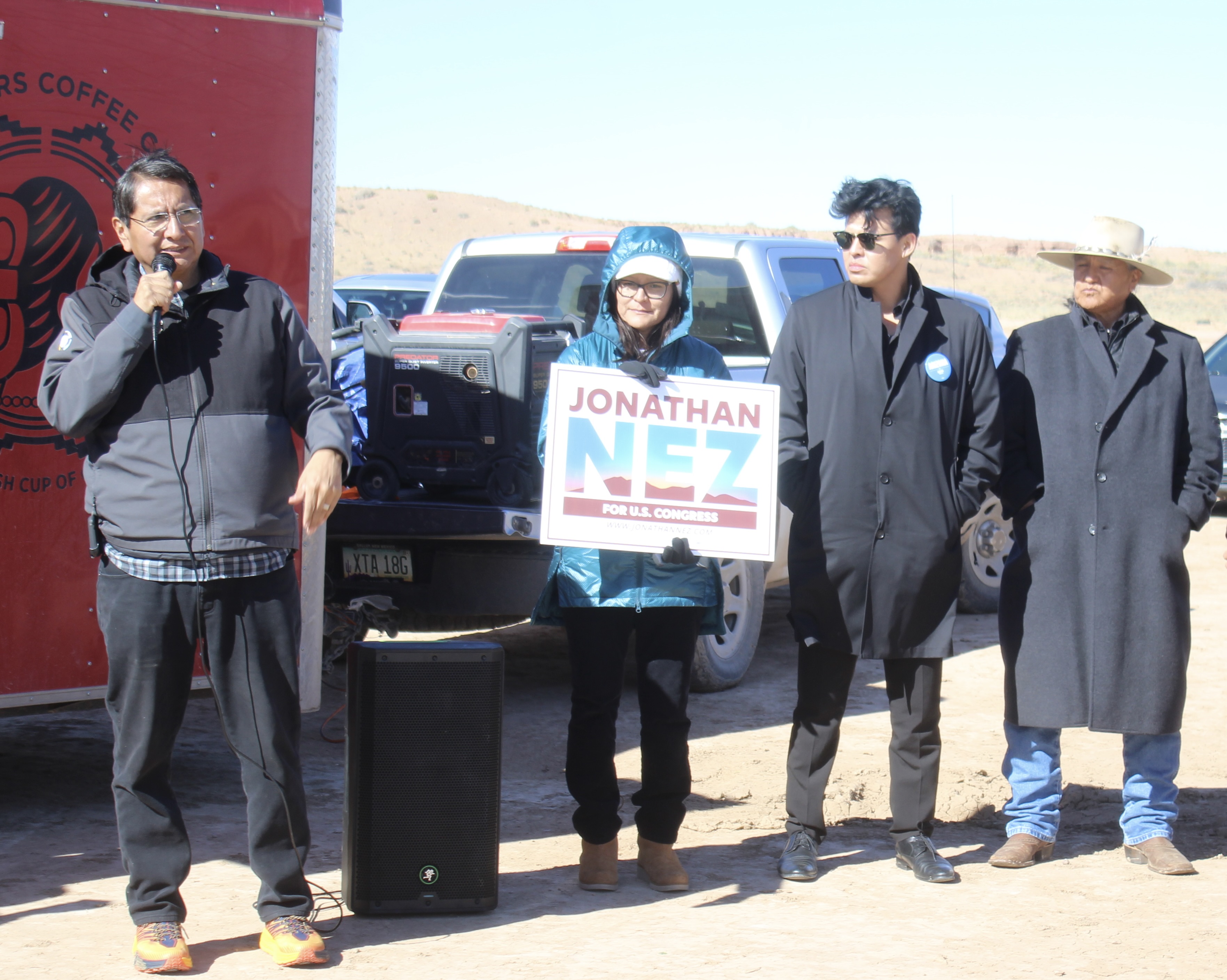
- Details
- By Levi Rickert
Native Vote 2024. NAVAJO NATION — Democratic congressional candidate Jonathan Nez recalls when he served as vice president of the Navajo Nation, he called in his security detail because they kept people away from him at public events. He wanted to be more accessible and be able to interact with the Navajo citizens.
Nez went on to become the president of the Navajo Nation. Now he is running for a seat in Congress.
His approach to being up close and accessible was on full display on Monday as he spent Election Day-even making four stops on the Navajo Nation. He started his day before 6 a.m. to travel to Window Rock, then made stops in Chinle and Keyanta before finishing the campaign swing in Tuba City, Ariz.
At all stops Nez shook hands and talked to supporters who braved cold November temperatures. Navajo Nation citizens thanked him for his service and told them they had already voted for him or would on Election Day.
https://www.nativenewsonline.net/currents/congressional-candidate-jonathan-nez-makes-4-stops-on-navajo-nation-on-monday#sigProId42a061f01a
Accompanying Nez on every stop was his wife, Phefelia, and Dark Winds actors Robert Mesa (Navajo/Soboba) and Anderson Kee (Navajo). Mesa, who splits his time between Santa Fe and Los Angeles, said he felt compelled to come back to the Navajo Nation where he spent his childhood to help Nez, as a way of giving back.
If elected Nez would be the first Native American to serve in Congress from Arizona and the first Navajo to ever be elected Congress.
Elected president of the Navajo Nation in 2019, Nez through his decisive and compassionate leadership led the Navajo people through the COVID-19 pandemic. The Navajo Nation was hit hard by the pandemic. Nez secured and oversaw resources to construct new health care facilities and homes for veterans, invested in public safety by hiring new police officers, and bolstered infrastructure, improving rural roads and bringing clean water and electricity to thousands of previously unserved residents. During 2020, he gained much national press coverage during the pandemic.
On Monday, he thanked supporters in Window Rock, the capital of the Navajo Nation, for their support during the harsh days of the pandemic.
“We saved lives during the Covid-19 pandemic,” Nez said. “Thank you for your support during the hard times. And I need your support now to send me to Washington to represent this congressional district.
“The reason why we are in the communities is to get you out to vote tomorrow,” Nez said.
Throughout the day, Nez integrated his native Navajo language with English so that he could reach those who speak little to no English.
“This is a very important election. We hear this every election. We hear this often, but this time is different. This election may be the most important of all time. What is on the line is democracy, health care, women’s rights to choose and even our land,” Nez told his supporters in Tuba City.
One Navajo woman from Flagstaff heard about the campaign event in Tuba City and drove over to visit with him.
The congressional district includes Apache, Coconino, Graham, Greenlee and Navajo counties and contains parts of Gila, Maricopa, Mohave, Pima, Pinal and Yavapai counties. It covers parts of the low desert south of Phoenix, widening east to the New Mexico border, then north to Utah and curving back west over Flagstaff to the Grand Canyon.
Prior to redistricting, part of the Navajo Nation in Arizona was in the state’s first congressional district. After redistricting, that portion became part of the second congressional district. The congressional includes 12 Native American tribes. Native Americans make up 22 percent of the voters in the district.
“This is an important time. We need to warrior up,” Nez said.
He referenced the Long Walk. He said it was the strong Navajo women who convinced federal officials to let our people go back to our Navajo land.“So don’t tell me a woman is not qualified to be president of the United States,” Nez said in Tuba City. “Tomorrow you need to go out and vote for Kamala Harris for president of the United States.”
The Nez campaign hopes his personal touch on the Navajo Nation will energize the Native vote across Arizona.
More Stories Like This
Native News Weekly (August 25, 2024): D.C. BriefsUS Presidents in Their Own Words Concerning American Indians
Native News Weekly (December 7, 2025): D.C. Briefs
Why We Report: Chez Oxendine Shares His Story for Native News Online’s Year-End Campaign
New Amnesty International Report Details Torture, Overcrowding at Krome and ‘Alligator Alcatraz’
Help us defend tribal sovereignty.
At Native News Online, our mission is rooted in telling the stories that strengthen sovereignty and uplift Indigenous voices — not just at year’s end, but every single day.
Because of your generosity last year, we were able to keep our reporters on the ground in tribal communities, at national gatherings and in the halls of Congress — covering the issues that matter most to Indian Country: sovereignty, culture, education, health and economic opportunity.
That support sustained us through a tough year in 2025. Now, as we look to the year ahead, we need your help right now to ensure warrior journalism remains strong — reporting that defends tribal sovereignty, amplifies Native truth, and holds power accountable.
 The stakes couldn't be higher. Your support keeps Native voices heard, Native stories told and Native sovereignty defended.
The stakes couldn't be higher. Your support keeps Native voices heard, Native stories told and Native sovereignty defended.
Stand with Warrior Journalism today.
Levi Rickert (Potawatomi), Editor & Publisher



